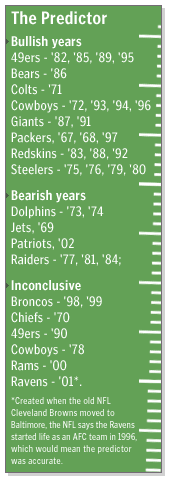NEW YORK (CNN/Money) -
As if Wall Street didn't have enough to worry about, this year's Super Bowl match-up suggests there's not a lot of hope for U.S. stocks to end their three-year slide.
The Super Bowl has been a relatively successful predictor of how the market will perform ever since the first Super Bowl in 1967. According to this theory, a win by a team from the old National Football League means stocks will end higher for that year, while a win by an old American Football League team means the bears reign on Wall Street.

Of course, anyone who bases investing decisions on the outcome of Sunday's game has probably been playing football without a helmet. But that hasn't stopped the indicator from getting the attention of football fans and investors, giving them something to talk about during the dull moments of the game.
And no matter how spurious it might be, the indicator has been wrong just seven times in the 36 years of the game, although its accuracy got dented during a recent four-year incorrect streak from 1998 through 2001 -- with bull markets following 1998 and 1999 victories by the Denver Broncos, an original AFL franchise, followed by bear markets in 2000 and 2001 following victories by the St. Louis Rams and Baltimore Ravens, which both started life in the pre-merger NFL.
Still, the predictor got back on track in 2002 when an upset victory by the AFL-born New England Patriots was followed by a third straight year of decline for stocks.
This year, as Wall Street faces continued concerns about a possible war with Iraq and continued questions about business practices hitting investor's confidence, another AFL-born team, the Oakland Raiders, is favored to win the game, suggesting another bearish year. But it's not clear that an upset win by the Tampa Bay Buccaneers would bring the bulls back to Wall Street.
That's because a Bucs win would be taking the indicator into uncharted territory, since it would be the first pure expansion team formed since the merger of the NFL and AFL to win the game -- one of the world's most widely watched sports events.
The franchise was founded in 1976, and its first year in the league it played in the American Football Conference, the successor to the old AFL. The following year it moved to the National Football Conference, where it has remained through various league reorganizations. But strictly by its roots, it's closer to being an AFL creation rather than an old NFL team.
While there have been numerous Super Bowls between two teams with NFL heritages, this is the closest there has ever been to two AFL descendants meeting in the big game.
As much attention as the Super Bowl gets as a market predictor, market observers find it easy to discount its reliability despite a strong track record.
"Wall Street has a bunch of football fans and it's something to do," said Jeff Hirsch of the Stock Trader's Almanac. "But I really hate the thing. It might be fun and all that stuff, but I put more credence into astrologic market predictors than the Super Bowl. It's just coincidental. There's no way the outcome of the football game has any effect on the stock market."
Of course it's possible that the Bucs aren't a good stock market indicator at all, since they were an expansion team. It could be that a victory by an expansion franchise just has to be excluded from the Super Bowl Stock Predictor formula.
The closest there has been to an expansion winner was the 2001 victory by the Baltimore Ravens. The Ravens were created when the old-NFL Cleveland Browns moved to Baltimore following the 1995 season, which seems to make them clearly an NFL team in terms of the predictor.
But the NFL's official position is that the new Cleveland Browns team formed for the 1999 season is the same as the original Cleveland Browns in terms of franchise records, meaning the Baltimore Ravens are therefore considered an expansion franchise.
Since the market fell following the Ravens win, considering them an expansion AFC franchise rather than an old NFL team would turn one of the indicator's seven mistakes into a correct prediction.

|

